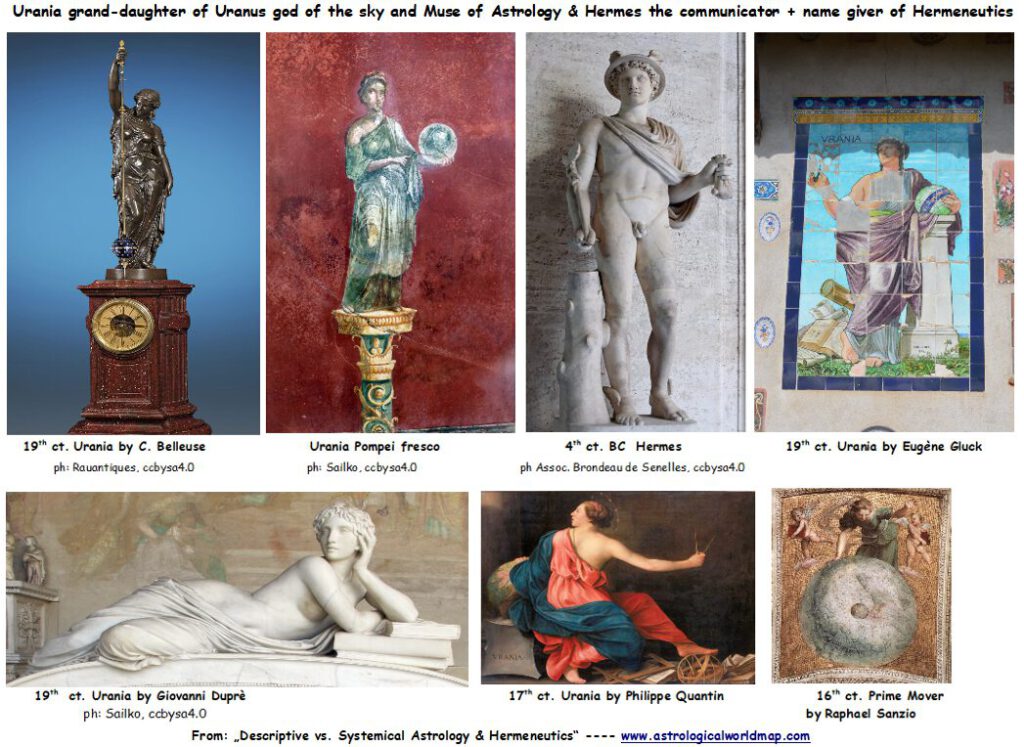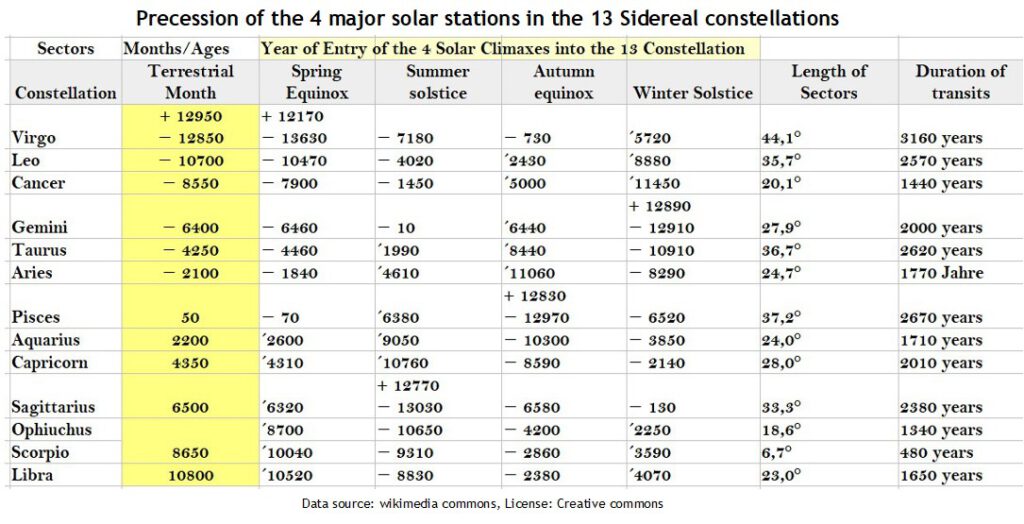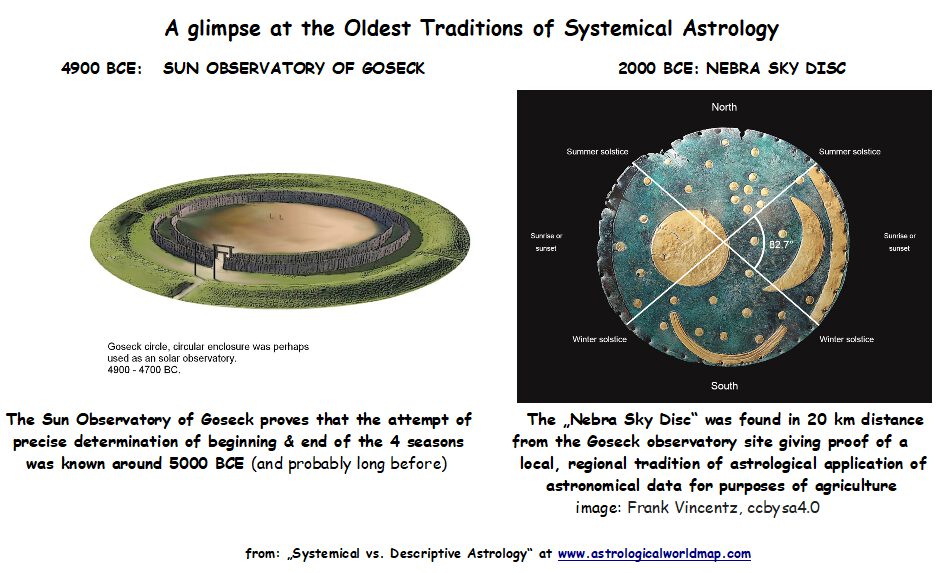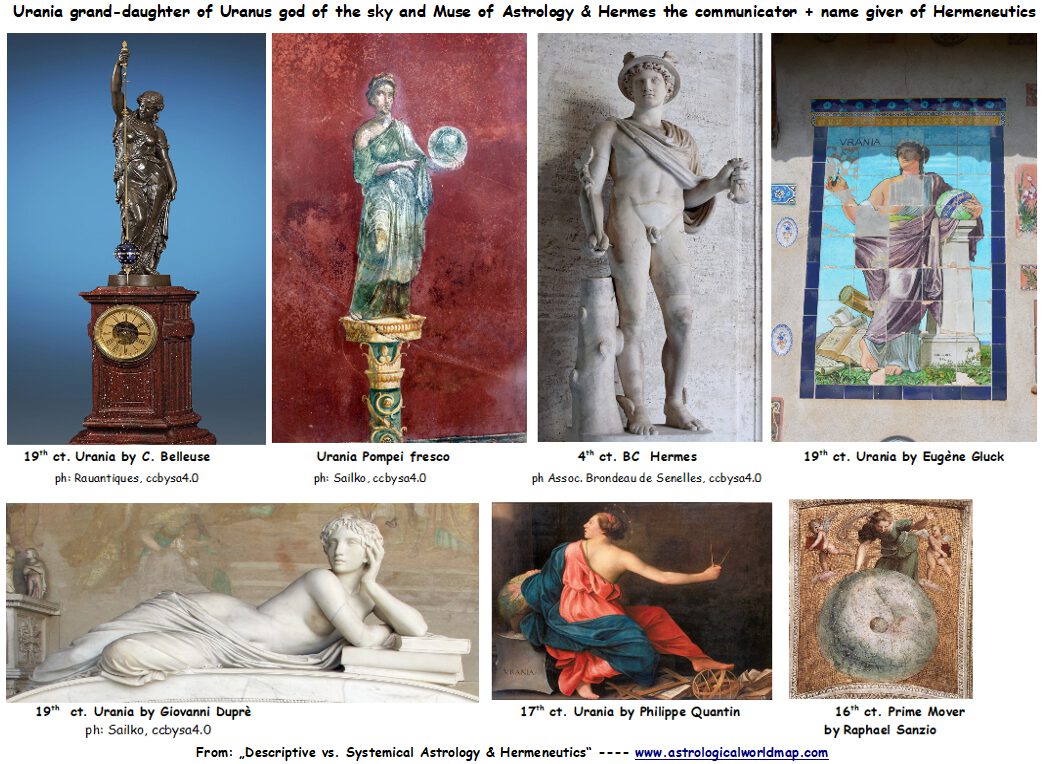Systemical vs. Descriptive Astrology. How to explore and recognize the problems and core issues of astrological hermeneutics.
Compare: On the typology of interpretation formula in astrology: basic knowledge for error analysis in astrological interpretation, Astrological geomancy – what is it ?
I`ll be working on this article in my astrological laboratory when I find the time for it. Please come back later to see what I found out.
Systemical vs. Descriptive Astrology.
- Definition vs description – what`s the duifference ?
- A — definition of systemical structure and interpretation of perception and/or imagination in relation to systemical structure
- B — description of perception and/or imagination and interpretation of description of perception and/or imagination

Attempting to explore, recapitulate and practice interpretation.is the core of astrological learning. So what could make astrology a hermeneutical science.
- The lowest and greatest common multiple of the meaning of the word “ASTROLOGY” may differ in different surroundings.
- And the vast majority of users of the word may not have a precise approach to differentiating and identification of the vast semantic fields in which the function that astrology has for individuals are exercised.
- But that does not mean that anything that the term is used for is actually precisely named under the title “astro-logy”.
- And precision may simply not be a common multiple and main purpose of its use anyway.
- But to whom it concerns precision matters.
- And today I am writing on this issue since a reader told me few days ago that astrological transits are not an intellectual game play but something she claimed that she and everyone had to live.
- So yes we live – on earth. And yes astrology is the most complicated and complex of sciences.
- And so intellectual precision does not necessarily have to be excluded from our subjective A — individual as well as B — group experience of realities like excitation, confusion, distortion, suffering, pain, love and ecstasy.
- And while we live have to be present and allow, endure, express and live both sides experience and reflection of all the 12 organs of our human system along with the 2 halves of our brains as well as all the karmic role patterns of behaviour and survival stored in our unconsious and conscious memory thta are conflict with our fuller potentials.
- So what we should be aware of is that astrology is an advanced science of interpretation of what we live, why we were born into that particular individuality that we experience and which patterns of role behaviour and successful survival prevent us from unfolding our fuller potentials.
Descripitve Astrology – what is it ?
Why and in what way is “sidereal astrology” anti-systemical ? Simply because its uses what it calls “zodiac signs” as descriptions not as definitions but on the background of their functions of precise structural definitions.

- I suggest the differentiation between descriptive and systemical astrology as a key to exploring the core issues of astrological hermeneutics.
- Because it seems one of the most important issues of astrology to sort out the problems related to these definitions.
- And I think it is an absolute basics for perceivers and thinkers to be conscious of, when they explore through describing perception or else when they conclude from abstract logic and mathematical structuralism.
- And we should be aware of the difference between description and interpretation too.
- And what we describe: A —. our own personal emotional & territorial issues (with or without reflecting that we talk about ourselves not astrolgy) B — our limited perception (with or without reflecting its limitations and relativity) C — the rules and formula that we heard of ( (with or without reflecting their limitations and relativity) D — deductions from abstract definitions (with or without reflecting their limitations and relativity)
- Why is it so important in astrology to differentiate between description and definition ? Its is very simple: Most astrological words, terms and names are symbols used for defintions. But learning of astrology requires understanding the definitions for which symbols are used in detail.
- That requires extensive time of learning not just by photographic memory but by independent personal integration of knowledge into the thinkers individual experience, reflection, digestion assimiliation between personality development and aquuired infromation and knowledege about fate, psyche, psychology, psychosomatics, spirit, soul, karmic evolution and karmic issues of patterns of role behaviour.
- And I say: learning of astrology is a long, long, long process and it is expensive because we cannot replace life time spent on learning by cheap and fast information. We need to assimilate the content of astrology not the pretence of consuming wordings.
- Why, where and when did I find and invent my diferentiation approach?
- Because I felt attracted by the outlook on a systemical approach to the definitions given in the zodiac from the very first moment I got into closer contact with astrology.
- I was 19 and 20 when I read my first two astrology books. And when I did I felt and thought that they dealt with the systemical question of astrology. I took it for granted that they did. They were: Sun Bear & Wabun – Medicine Wheel, Philip Metman – Mythos und Schicksal.(Greek myths & fate)
- So what is descriptive astrology ? How can we describe and define it ? And what are its main problems ?
- And I suggest to use systemical defintions of the 12 organs of the 4 bodies (material, emotional, mental, spiritual) in order to explore all the different levels and aspects of “Descriptive Astrology” in detail.
- If we assume that astrology is an activity the “descriptive method” or “descriptive part” is a wording, expression, recapitulation, of :
- A – what we see. And ideal concept of descriptive astrology should assume that this basical step is made in the form of contemplation on what we see. But what if our reactions to what we see overwrites
- B – what we think. We may want to describe what we see – but our inner monologue and other reflexes may overwrite what we see.
- C – what we feel. We may describe what feel as well as what we see what we see. But we may also describe what we feel without allowing what we see.
- D – what we channel – meaning “put in words or throught or speak out – before conscious mental reflection and control”.. There may be a technique of that we understand as channeling but which we practice by describing a channeled perception, intuition or infromation. That too can be explored by the medium and the listener too.
- E – what we think we see, feel, think
- F – what we are able to communicate in words
- G – what we are used to, ready to and allowed to communicating out of what we see, feel, think. While we describe we make decisions on preferences and leave out things that may be far more important than what we actually put in words.
- Why is it so important to differentiate between description of a phenomenon on earth and a description of the astrological position of a planet ?
- It is of great value and an important key to precision of interpretation and thinking to know whether what we describe is : – an ASTROLOGICAL ASPECT made by a planet or sign or its assumed I — resonance, II — correspondence, III — coincidences, IV — reflections, V — effects, VI — outcomes
- Because if we conclude and provide information regarding an individual, entity, object or event in astrology we refer to the TERRESTRIAL RESULT of a CELESTIAL ASTROLOGICAL ASPECT.
- If we conclude the TERRESTRIAL OUTCOME of a CELESTIAL PLANETARY OR CELESTIAL BODY ASPECT the logical step according to astrological methodology is that we either A —- make a deduction from the systemical definitions as provided by the systemical fundament of tropical astrology or B — nake a transfer from a formula book for astrological positions written by a so-called authority. But quoting knowledge based on an understanding that we do not possess ourselves but received from the ancients, the gurus, teachers, authorities and so on is a diffult method to handle too.
- Because when applying a quote that we cannot deduct and evaluate from our own experience and knowledge we would have to find a way to describe the meaning, impacts and effects of an aspect.
- But while quoting we still need to explore the limitations of the validity of the hints provided in the formula book or quote learned from some apparent “authority”
- Why and in what way is the use of adjectives problematic ? The use of adjectives is the greatest source of imprecision. Aquarius is not free, Leo not self-confident, Taurus not peaceful, Libra not elegant, Virgo not reasonable Gemini not clever, Capricorn not indepndent and Aries not aggressive. They want to learn to be.
- A full dead end of the adjectivism method comes when a terrestrial phenomenon is described with an adjective made out of an astrological symbol: In such wordings the use of a planet or sign as an adjective for an individual includes and provides the association of a systemical definition.
- That method is used for scapegoating single signs and planets. And it is systemically used for the mainstream outsiders – outlaws: confused, crazy, instable, unpredictable, extraterrestrian “Uranian” for Uranus & Aquarius, Hyper aggressive or evil “Plutonian” for Pluto and Scorpio and so on.
- What is the problem when adjectives overwrite and replace the definitions ? Astrology books are symptomatically written and any published only for beginners because the more advanced the astrologers the less books they consume. There is simply no market for advanced astrology because there are no consumers.
- And reading of books and consuming of lessons simply cannot replace independent observation, evaluation, digestion and whats most important. experience of application of information from books or teachers.
- What is the function of description in the process of interpretation ?
Systemical Astrology – What is it ?

- In the Greek Zoodisc definitions of 12 equally long and large stations and elements of the solar year were put together in order to create a systemical image of the relations between the 12 solar months.
- Yes that step in which the “Modern Greek Zoodisk” was framed to a systemical concept wasn`t the first attempt to a 12 fold zodiac in cultural history. In fact a number of attempts had been made before that.
- Determination of the solstices and equinoxes along with the 4 equally long seasons of the solar year was the first stage of systemical astrology.
- It was later differentiated into the 12 months system
- The 12 month year was used in Babylonian and Chaldean astronomy and its application to terrestrial matters through astrological conclusion, deduction and interpretation.
- But it is the one that was useful and precise enough to serve as a structural definition for the 4 seasons of the solare year in the Northern hemisphere.
- The names for the 12 divisions of the solar year summarized under the headline of a ZOO – DISC meaning ZOO-CIRCLE and the mythological and fairy tale name-titles given to gods were actually chosen to provide abstract definitions for the quality, character, meaning, impact and symbolism of the planets.
- The astronomical definitions and the astrological definitions need to be differentiated here too.
- Astronomical definitions are provided by the positions and material qualities of the planets.
- Astrological definitions are applications and interpretations of astronomical definitions

